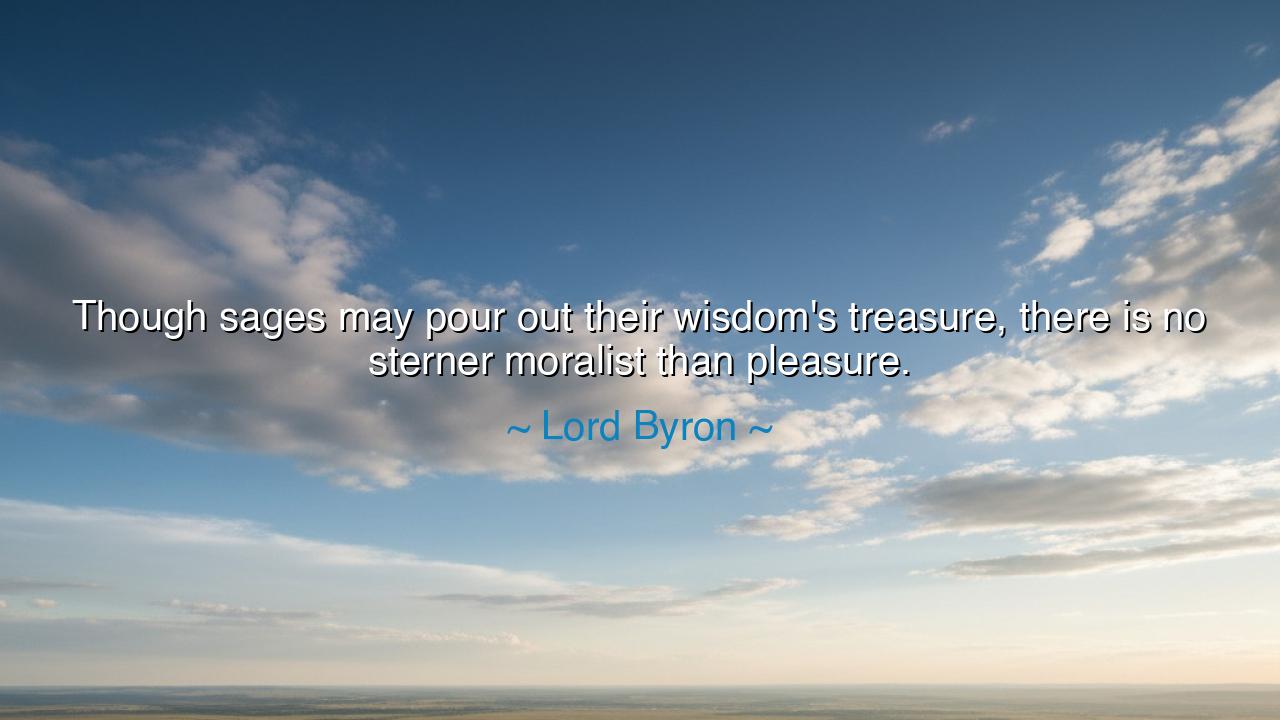
Though sages may pour out their wisdom's treasure, there is no
Though sages may pour out their wisdom's treasure, there is no sterner moralist than pleasure.






Hear me, O children of the future, for I bring to you a truth spoken by the noble Lord Byron: "Though sages may pour out their wisdom's treasure, there is no sterner moralist than pleasure." These words strike at the very core of human nature, reminding us that while wisdom may be offered freely, it is the pursuit of pleasure—that most seductive of forces—that teaches us the hardest lessons. The wise may speak of virtue, discipline, and restraint, but it is through our desires, our indulgences, and the consequences they bring that we learn the true nature of self-control.
Consider the ancient Greeks, who celebrated both the pursuit of knowledge and the pleasures of life. In their myths and stories, gods and mortals alike sought both wisdom and indulgence, and yet, it was often through the pursuit of pleasure that their downfall was realized. Homer’s "Iliad" and "Odyssey" are filled with moments where heroes, like Achilles and Odysseus, must confront their own desires—be it revenge, glory, or comfort—and learn that true wisdom lies not in their indulgence, but in their ability to master it. Their pleasures—however sweet—were the very trials that revealed their weaknesses.
In more recent times, we see the same lessons unfold in the lives of historical figures whose pursuit of pleasure led to their ultimate ruin. Think of King Louis XVI and the opulence of the French court. Surrounded by luxury and indulgence, he and his court were blind to the suffering of the people. Their pursuit of pleasure was unrestrained, and though sages and philosophers warned of the coming storm, it was the painful lessons of revolution, spurred by the desires of the oppressed, that taught them the harshest moral truths. Pleasure had become their moralist, delivering a lesson that no sage could impart.
Lord Byron, in his reflection, speaks not just of the excesses of others, but of the human condition itself. We are all drawn to the fleeting joys of pleasure, whether in the form of wealth, comfort, or sensuality. Yet, as we indulge, we often find that these pleasures, though alluring, carry within them the seeds of their own destruction. Pleasure, like a fire, warms the soul but can consume the spirit if not carefully controlled. The lesson is not in rejecting pleasure altogether, but in understanding that it is not the pleasure itself that leads to fulfillment, but the balance between indulgence and wisdom.
So, O children, remember this: while sages may speak of lofty truths, it is pleasure—in all its forms—that will teach you the true nature of wisdom. It is through our indulgence that we often learn our deepest lessons, for pleasure strips away the illusions we hold about ourselves and forces us to confront the consequences of our actions. Let it be your guide, but not your master. Let wisdom temper your desires, so that you may navigate the temptations of the world and emerge stronger, not weaker, for having faced them.






AAdministratorAdministrator
Welcome, honored guests. Please leave a comment, we will respond soon